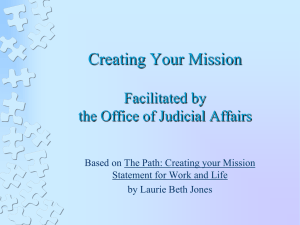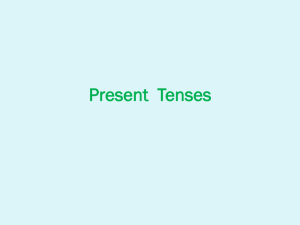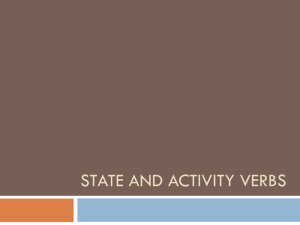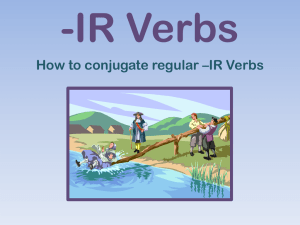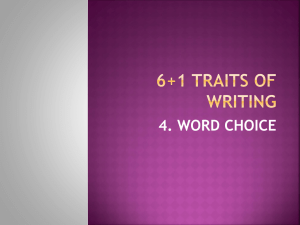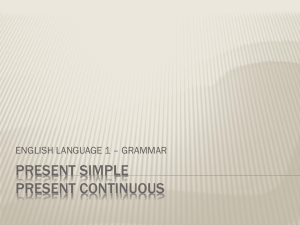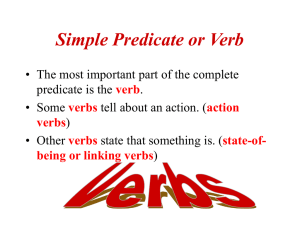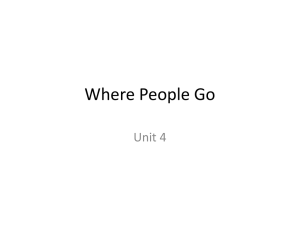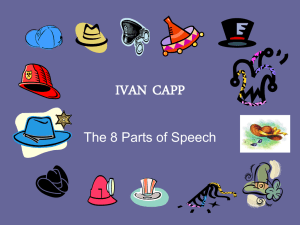Diapositiva 1 - vanesarubion
advertisement
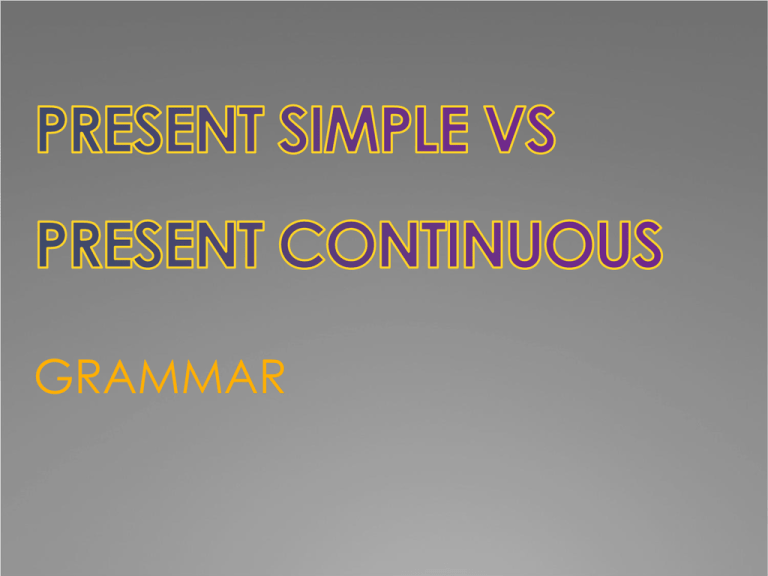
GRAMMAR PRESENT SIMPLE PRESENT CONTINUOUS We use the Present Simple to talk about: We use the Present Continuous to talk about: 1) A habit, a repeated action, a routine. Students go to school five days a week. 1) 2) A fact that is always true, a state: general truths and definitions. Water boils at 100º Celsius. 2) A temporary situation. As her house is being redecorated, she’s staying at her friend’s house. 3) A more permanent situation. I live in Terrassa. 4) To express likes & dislikes, thoughts, opinions and feelings (STATIVE VERBS). I don’t like fish, but I love meat. An action or activity progress now. We are studying English. in 3) An action or activity happening around now, but probably not at this moment. I’m reading a very interesting book written by Marina Lewycka. Audrey is on holiday in Italy. Put the verbs in the Present Simple or the Present Continuous. Audrey 1 work in Dublin, but she 2 not live there. Every morning, she 3 get up at 7.00 and she 4 go by bus to Dublin. The journey 5 take a half an hour and she 6 not get home until 7.00 in the evening. Then, she 7 read a magazine and 8 go to bed. She 9 have a good job, but she 10 work very hard. She 11 not work now. She 12 have a holiday. She 13 stay in a hotel in Madeira. She 14 meet a lot of interesting people. She 15 learn some Portuguese and she 16 eat a lot of good Portuguese food. She 17 love her job, but she 18 enjoy her holiday so much that she 19 not want to go back to work next week. Audrey is on holiday in Italy. Put the verbs in the Present Simple or the Present Continuous. Audrey 1 works in Dublin, but she 2 doesn’t live there. Every morning, she 3 gets up at 7.00 and she 4 goes by bus to Dublin. The journey 5 takes a half an hour and she 6 doesn’t get home until 7.00 in the evening. Then, she 7 reads a magazine and 8 goes to bed. She 9 has a good job, but she 10 works very hard. She 11 isn’t working now. She 12 is having a holiday. She 13 is staying in a hotel in Madeira. She 14 is meeting a lot of interesting people. She 15 is learning some Portuguese and she 16 is eating a lot of good Portuguese food. She 17 loves her job, but she 18 is enjoying her holiday so much that she 19 doesn’t want to go back to work next week. STATIVE VERBS With certain verbs we never use the continuous form. These are called STATIVE VERBS. The most common ones are: 1) Verbs that express thoughts and opinions: believe, forget, guess, know, mean, remember, seem, think (=believe), understand. 2) Verbs that express likes or preferences / feelings and emotions: dislike, hate, hope, like, love, prefer, want. 3) Verbs that express state or possession: be, belong, have (got), own. 4) Verbs that express cost and measure: cost, weigh, measure. 5) Verbs that express perception and senses: feel, hear, see, REMEMBER!!! Some STATIVE VERBS can be used both in the Present Simple and the Present Continuous, but their meanings are different: PRESENT SIMPLE PRESENT CONTINUOUS LOOK (= parecer) LOOK (= mirar) TASTE (= saber bien) TASTE (= probar) FEEL (= sentirse) FEEL (= tocar) HAVE (GOT) (= tener) HAVE (= tomar) THINK (= creer, opinar) THINK (= pensar) SEE (= ver - sentido) SEE (= ver – al médico…) Complete the dialogue, using the Present Simple or the Present Continuous. - “you 1 know that girl over there? The one who 2 wear the green jacket?” - “Yes, I 3 know her, but I 4 not remember her name. I 5 think it’s Kyra, but I 6 not be sure.” - “She 7 talk to James Howard. I 8 think he 9 like her.” - “Well, he 10 seem a bit stupid at the moment.” - “Why? What you 11 mean? - “Well, he 12 realise that her boyfriend 13 stand behind him?” - “No, I 14 not think he 15 know!!! Complete the dialogue, using the Present Simple or the Present Continuous. - “1 Do you know that girl over there? The one who 2 is wearing the green jacket?” - “Yes, I 3 know her, but I 4 don’t remember her name. I 5 think it’s Kyra, but I 6 am not sure.” - “She 7 is talking to James Howard. I 8 think he 9 likes her.” - “Well, he 10 seems a bit stupid at the moment.” - “Why? What 11 do you mean? - “Well, 12 does he 13 realise that her boyfriend is standing behind him?” - “No, I 14 don’t think he 15 knows!!!
